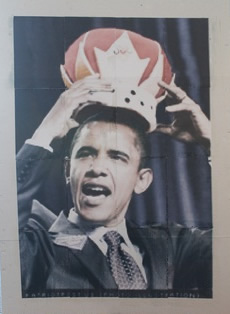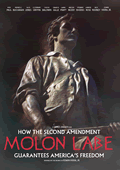IMPERIAL PRESIDENCY: OBAMA'S EXECUTIVE OVERREACH MUST BE STOPPED, SAY LAWMAKERS
By
NWV News Writer Jim Kouri
Posted 1:00 AM Eastern
March 9, 2014
© 2014 NewsWithViews.com
U.S. House of Representatives GOP leaders on Tuesday introduced a bill written to stymie what is being called Executive Overreach by lawmakers, constitutional experts and civil libertarians.
Reps. Trey Gowdy, R-S.C., Darrell Issa, R-Calif., and Bob Goodlatte on behalf of the House Judiciary Committee unveiled H.R. 4138, the Executive Needs to Faithfully Observe and Respect Congressional Enactments of the Law Act -- or simply ENFORCE the Law Act -- as a result of President Barack Obama's past use of executive actions designed to make an end run around the nation's legislative branch of government.
The
congressmen are also anticipating more of the same since Obama has boasted
he has a "phone and a pen" that he will use to push his agenda
be it  gun
control, climate change, the U.S. economy and other issues important
to the left-wing of his political party.
gun
control, climate change, the U.S. economy and other issues important
to the left-wing of his political party.
Issa, who chairs the House Oversight Committee, Goodlatte, chairman of the Judiciary Committee, and Gowdy who is a ranking member of those committees, all claim they wish to return to a government system that balances "the separation of powers enshrined in the [U.S.] Constitution."
According to the three lawmakers, the law was written following the examination of Obama Administration's selective enforcement of federal laws and his Attorney General's interference in the laws of individual states if the President and Attorney General, Eric Holder, oppose the law or disagree with its outcomes.
One of the witnesses, constitutional scholar Professor Jonathan Turley of George Washington University, a self-described liberal, testified:
"President Barack Obama has crossed the constitutional line between discretionary enforcement and defiance of federal law. Congress is given the defining function of creating and amending federal law. This is more than a turf fight between politicians. The division of governmental powers is designed to protect liberty by preventing the abusive concentration of power. All citizens –Democratic or Republican or Independent – should consider the inherent danger presented by a President who can unilaterally suspend laws as a matter of presidential license.
"In recent years, I have testified and written about the shift of power within our tripartite government toward a more Imperial Presidential model. Indeed, I last testified before this Committee on the assertion of President Obama that he could use the recess appointment power to circumvent the Senate during a brief intrasession recess. While I viewed those appointments to be facially unconstitutional under the language of Article I and II (a view later shared by two federal circuits), I was equally concerned about the overall expansion of unchecked presidential authority and the relative decline of legislative power in the modern American system.
"The recent non-enforcement policies add a particularly menacing element to this pattern. They effectively reduce the legislative process to a series of options for presidential selection ranging from negation to full enforcement. The Framers warned us of such a system and we accept it – either by acclaim or acquiescence – at our peril."
During one of the Committee's hearings Turley and other witnesses explained the meaning of Article II, section 3, of the U.S. Constitution, according to Gowdy, who is the chief sponsor of the bill:
"[That section] declares that the President 'shall take care that the laws be faithfully executed.' However, President Obama has failed on several occasions to enforce Acts of Congress that he disagrees with for policy reasons and has also stretched his regulatory authority to put in place policies Congress has refused to enact. While President Obama is not the first to stretch presidential powers beyond their constitutional limits, executive overreach has accelerated at an alarming rate under his Administration."
The goal of the ENFORCE the Law Act is to prevent or at least hinder executive overreach, and the act gives lawmakers a process which allows either the House or the Senate to file lawsuits against the Executive Branch for any failures to faithfully execute the laws, according to H.R. 4138.
“This administration’s disregard for the law has reached an unprecedented level from a constitutional perspective. From unilaterally changing the Affordable Care Act, to suspending parts of our immigration laws, to ignoring statutory mandatory minimum laws in narcotics cases, the President’s actions threaten to usurp our system of co-equal branches of government. We have pursued certain remedies afforded to Congress to address executive overreach but these efforts have been thwarted. This bill is necessary; it will give Congress the authority to defend this branch of government as the Framers and our fellow citizens would expect," Gowdy said in his statement.
“The Constitution is clear: the President has a duty to faithfully execute the law—regardless of whether he likes the law or if it is politically expedient,” he added.
|
“It is up to the Congress and the courts to check the President’s overreach and restore balance to our system of government. That is why I have joined Congressman Gowdy and Issa in introducing the ENFORCE the Law Act. Preventing the President from overstepping the boundaries of his constitutional authority is not about partisan politics. It is about preserving the fundamental premise of our constitutional design: that a limited government, divided into three separate branches exercising enumerated powers, is necessary to protect individual liberty and the rule of law,” said Rep. Goodlatte.
© 2014 NWV - All Rights Reserved












 Share
This Article
Share
This Article




